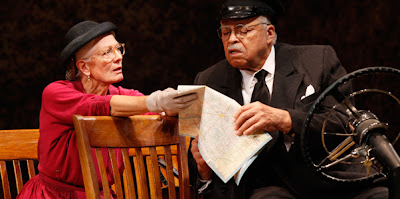The first thing I do when I go to see a play at the Mint Theater Company is check out the bookshelf in its lobby. The Mint specializes in works by playwrights who have been forgotten and those of well-known writers that have been overlooked. The bookshelf is usually well stocked with relevant readings—histories, biographies, novels about the period—that put that evening’s play in perspective.
But there were only two books on display when my theatergoing buddy Bill and I went to see the company’s latest effort, What the Public Wants. The first book was a copy of the play, written by Arnold Bennett, the British journalist and author once ranked the literary equal of his contemporaries H.G. Wells, Rudyard Kipling and J.M. Barrie and who was so revered that London's Savoy Hotel even named an omelette after him (it was made with haddock, heavy cream and parmesan cheese).
The second book was a biography of Rupert Murdoch called “The Man Who Owns the News.” That might also have been the subtitle of What the Public Wants. For the play centers around a turn-of-the-last-century press baron named Charles Worgan, who, as Murdoch later would, has made a bundle from publishing tabloids whose stock and trade are sensationalist stories about sex and crime.
Worgan's papers, he proudly says several times during the play, are “what the public wants.” The trouble comes when he falls in love with a woman of more refined taste. The play is supposed to have been inspired by the life of Alfred Harmsworth, a tabloid pioneer who later gained the title of Lord Northcliffe. So you might think of What The Public Wants as kind of a "Citizen Kane," only without the Rosebud.
I suspect that, as with "Citizen Kane," much of the play’s appeal when it debuted in 1909 came from the zing of guessing which parts of it were true and who the characters were in real life. But What the Public Wants, a fairly straight forward piece of work, is less daring in its artistic form than "Citizen Kane" was in filmmaking. There’s less fizz in the satire without the contemporary comparisons, which means the play is less fun. And the Murdoch similarities are far too few and removed in time to help.
Of course, the trick with any revival, but most especially with the Mint's old plays that don’t enjoy the protective cloak of familiarity, is to find a way to make them relevant to contemporary audiences. Embedded in What the Public Wants are some still sharp observations about social mobility, cultural authority and whether journalism has the responsibility to give the masses what they want or the right to determine what they need.
But the acting in What the Public Wants is wildly uneven (the most glaring example is that all of the characters are supposed to be British but only a few of the actors attempt English accents). And because the company’s small budget requires several cast members to double (and in one case triple) in roles, the characters aren’t as clearly drawn as they might be.
Meanwhile director Matthew Arbour has clearly struggled to find the through line that will pull them and the play altogether (click here to listen to him discuss the challenge).
The Mint always manages to mount handsome shows and set designer Roger Hanna and costume designer Erin Murphy have maintained that standard this time out. And the company continues to get points for doing works you never see anywhere else. But sometimes you need more than that. Sometimes, what the public wants is the payoff of a Rosebud.









